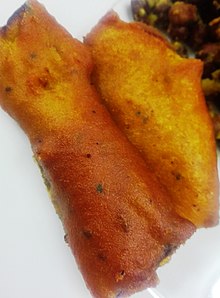Beguni
 Beguni | |
| Alternative names | বেগুনী |
|---|---|
| Place of origin | Bangladesh, India |
| Region or state | Bengal region of the Indian subcontinent |
| Associated cuisine | Bangladesh, India |
| Main ingredients | Brinjal (eggplant) |
Beguni (Template:Lang-bn) is a Bengali snack originating from the Bangladesh made of eggplant (also known as aubergine or brinjal) which is sliced and battered before being either fried or deep fried in oil. This dish is also popular in eastern India, especially West Bengal.[1][2] A similar European dish is known as aubergine fritters.[3] An almost identical dish is made in the Caribbean, namely in Trinidad & Tobago and Guyana, called baiganee, consisting of sliced eggplant battered in pholourie batter. [4]

The dish may be prepared by coating eggplant with besan paste and then frying the pieces in oil.[5] The eggplant is usually cut longitudinally (Template:Lang-bn begun) and dipped in a batter of Bengal gram flour with salt and turmeric, and deep-fried in mustard oil. Sometimes a small amount of poppy seeds is added to the batter. Some people prefer adding a small amount of baking powder to the batter to make it crunchier. It is commonly consumed along with puffed rice and is an extremely popular street food in the country's cities. It is normally an evening snack in Bengali households and is a very common component of Iftar in Bangladesh during the month of Ramadan of the Islamic calendar.
Beguni is also a quintessential component of the Bengali monsoon cuisine, where it is consumed along with rice and lentil preparation called Khichuri. It is also served as a snack and consumed with tea.
See also
References
- ^ Manohar Sajnani (2001). Encyclopaedia of Tourism Resources in India. Gyan Publishing House. p. 22. ISBN 978-81-7835-017-2.
- ^ Jane Grigson (2007). Jane Grigson's Vegetable Book. U of Nebraska Press. p. 46. ISBN 0-8032-5994-8.
- ^ Sally Miller (2008). Contemporary Caribbean Cooking. Miller Publishing Co. Ltd. p. 18. ISBN 978-976-8079-75-6.
- ^ Pholourie & Baiganee
- ^ Uses of Tropical Grain Legumes: Proceedings of a Consultants Meeting, 27-30 Mar 1989, ICRISAT Center, India. ICRISAT. 1991. pp. 108, 335. ISBN 978-92-9066-180-1.

